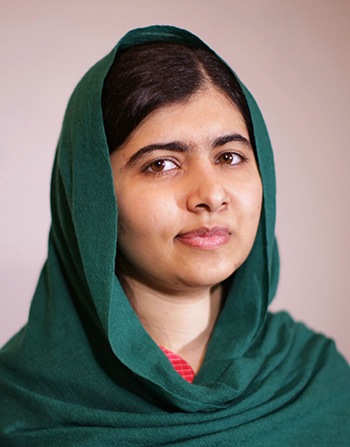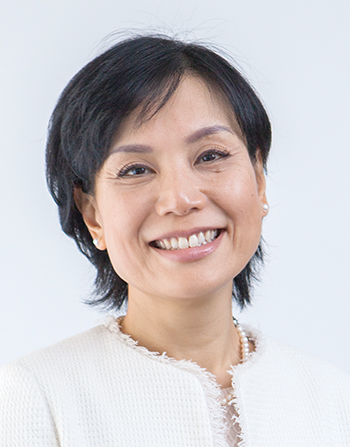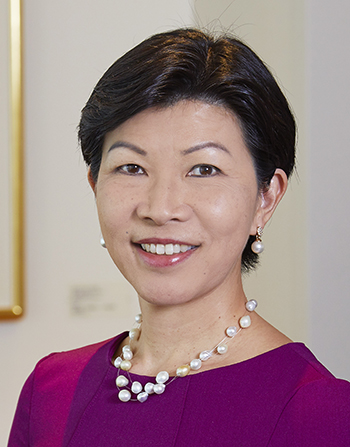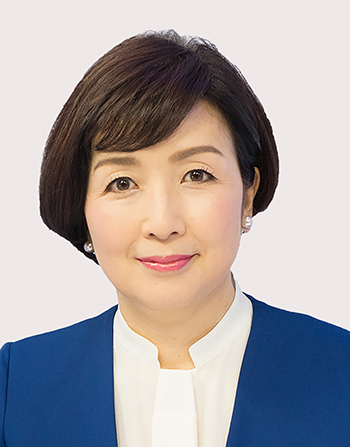This event now concluded. Video available here
- Video Message:
Malala YOUSAFZAI (Education Activist; 2014 Nobel Peace Prize Laureate) - Speakers:
● Lin KOBAYASHI (Co-founder and Chair of the Board, UWC ISAK Japan),
● Kathy MATSUI (Board Member, Asian University for Women Support Foundation) - Moderator: Aiko DODEN (Special Affairs Commentator, NHK World TV, Japan Broadcasting Corporation)
- Date: Friday, January 22, 2021, 6:00–7:00 pm (JST)
- Venue: Online
- Co-organized by: Asia Society Japan Center, Mitsubishi UFJ Research and Consulting, Shahani Associates Limited
- Supported by: Japan Foundation Asia Center, MRA Foundation, Tanaka UK Japan Educational Foundation
- Language: English / Japanese (with simultaneous interpretation)
- Admission: Free
In a joint effort with partner organizations, I-House will hold a new webinar series inviting leaders from the Indo-Pacific region as speakers starting in January 2021. In this session, Lin Kobayashi of UWC ISAK Japan and Kathy Matsui of Asian University for Women—both of whom are deeply committed to cultivating the next generation of leaders—will discuss education in the Covid era.
Having tackled the issue of educational disparity stemming from poverty and/or gender discrimination for many years, how have Kobayashi and Matsui looked at the learning inequalities around the world exacerbated by Covid-19 and attempted to turn the various crises they have faced into opportunities to continue their mission of nurturing new leaders? We are delighted to be joined also by Malala Yousafzai, education activist from Pakistan and the youngest Nobel Prize laureate, who will be delivering a keynote speech at the beginning of this session.
Recording of the livestream
*If you would like to watch in Japanese (simultaneous interpretation), please click here
 Born in Mingora, Pakistan, in 1997, Malala Yousafzai is an activist for female education. In 2008 when she was 11, Taliban took control of her town in the Swat Valley and denied her and her female classmates the opportunity to attend school. Yousafzai, however, began to speak out publicly on behalf of girls on their right to learn and continued to fight for gender equality—even after receiving death threats from the Taliban. In 2013, she was awarded the Simone de Beauvoir Prize, an international human rights prize awarded to individuals or groups fighting for women’s freedom. In the same year, she co-founded the Malala Fund, a nonprofit organization dedicated to helping girls go to school and reach their full potential. In 2014, at age 17, Yousafzai became the youngest person ever to receive the Nobel Peace Prize, and in 2017 she was named a UN Messenger of Peace. Graduating from Oxford University in 2020, Yousafzai continues to work assiduously for the 130 million girls who are out of school across the globe today.
Born in Mingora, Pakistan, in 1997, Malala Yousafzai is an activist for female education. In 2008 when she was 11, Taliban took control of her town in the Swat Valley and denied her and her female classmates the opportunity to attend school. Yousafzai, however, began to speak out publicly on behalf of girls on their right to learn and continued to fight for gender equality—even after receiving death threats from the Taliban. In 2013, she was awarded the Simone de Beauvoir Prize, an international human rights prize awarded to individuals or groups fighting for women’s freedom. In the same year, she co-founded the Malala Fund, a nonprofit organization dedicated to helping girls go to school and reach their full potential. In 2014, at age 17, Yousafzai became the youngest person ever to receive the Nobel Peace Prize, and in 2017 she was named a UN Messenger of Peace. Graduating from Oxford University in 2020, Yousafzai continues to work assiduously for the 130 million girls who are out of school across the globe today.
 Lin Kobayashi is Co-founder and Chair of the Board of UWC ISAK Japan, a residential high school opened in Karuizawa in 2014 with a mission to nurture transformational leaders who explore new frontiers and make a positive impact. Formerly known as ISAK, the school became the 17th member of the United World Colleges (UWC) in 2017. Prior to ISAK, Kobayashi worked for UNICEF in the Philippines, where she conducted non-formal education projects for street children and realized the strong need for leadership education. She was selected as a Young Global Leader by the World Economic Forum in 2012, Change-maker of the Year 2013 by Nikkei Business, Woman of the Year 2015 by Nikkei Woman, Yale World Fellow 2017, and EY Entrepreneur of the Year 2019 Japan. Kobayashi has also served on the board of the Asia Pacific Initiative since 2018 and the UWC International Board since 2020. She holds a BA from the University of Tokyo and an MA in Education from Stanford University.
Lin Kobayashi is Co-founder and Chair of the Board of UWC ISAK Japan, a residential high school opened in Karuizawa in 2014 with a mission to nurture transformational leaders who explore new frontiers and make a positive impact. Formerly known as ISAK, the school became the 17th member of the United World Colleges (UWC) in 2017. Prior to ISAK, Kobayashi worked for UNICEF in the Philippines, where she conducted non-formal education projects for street children and realized the strong need for leadership education. She was selected as a Young Global Leader by the World Economic Forum in 2012, Change-maker of the Year 2013 by Nikkei Business, Woman of the Year 2015 by Nikkei Woman, Yale World Fellow 2017, and EY Entrepreneur of the Year 2019 Japan. Kobayashi has also served on the board of the Asia Pacific Initiative since 2018 and the UWC International Board since 2020. She holds a BA from the University of Tokyo and an MA in Education from Stanford University.
 Kathy Matsui joined Goldman Sachs in 1994 and was named managing director in 1998 and partner in 2000. Until 2020, she served as vice chair of Goldman Sachs Japan, co-head of Macro Research in Asia, and chief Japan equity strategist. She is known for her work on “womenomics”—the term she coined in 1999 calling for an increase in female workforce participation in Japan to revive the country’s economic growth—and has served on numerous government committees for the promotion of gender diversity in Japan. In 2007, she was chosen by the Wall Street Journal as one of the “10 Women to Watch in Asia” and in 2014 she was named to Bloomberg Markets magazine’s “50 Most Influential” list. She is currently a board member of the Asian University for Women (AUW) Support Foundation committed to empowering women through education and chair of the Board of Councilors (Japan) of the US-Japan Council. She earned an AB from Harvard University and an MA from Johns Hopkins School of Advanced International Studies.
Kathy Matsui joined Goldman Sachs in 1994 and was named managing director in 1998 and partner in 2000. Until 2020, she served as vice chair of Goldman Sachs Japan, co-head of Macro Research in Asia, and chief Japan equity strategist. She is known for her work on “womenomics”—the term she coined in 1999 calling for an increase in female workforce participation in Japan to revive the country’s economic growth—and has served on numerous government committees for the promotion of gender diversity in Japan. In 2007, she was chosen by the Wall Street Journal as one of the “10 Women to Watch in Asia” and in 2014 she was named to Bloomberg Markets magazine’s “50 Most Influential” list. She is currently a board member of the Asian University for Women (AUW) Support Foundation committed to empowering women through education and chair of the Board of Councilors (Japan) of the US-Japan Council. She earned an AB from Harvard University and an MA from Johns Hopkins School of Advanced International Studies.
 Aiko Doden has expertise in reporting on a wide range of global issues from hard security to human security. As a commentator, she covers Southeast Asia, Japan-US relations and Japan’s foreign policy. Doden is a popular face on TV, having anchored key news programs such as NHK Good Morning Japan, NHK News at 9 PM, NHK World Network, and NHK Asian Voices. She was a correspondent based in Thailand extensively covering ASEAN countries. She holds an MA from Columbia University and translated I Am Malala: How One Girl Stood Up for Education and Changed the World into Japanese (Iwanami Shoten, 2014). She has served as Trustee at the International House of Japan since 2018.
Aiko Doden has expertise in reporting on a wide range of global issues from hard security to human security. As a commentator, she covers Southeast Asia, Japan-US relations and Japan’s foreign policy. Doden is a popular face on TV, having anchored key news programs such as NHK Good Morning Japan, NHK News at 9 PM, NHK World Network, and NHK Asian Voices. She was a correspondent based in Thailand extensively covering ASEAN countries. She holds an MA from Columbia University and translated I Am Malala: How One Girl Stood Up for Education and Changed the World into Japanese (Iwanami Shoten, 2014). She has served as Trustee at the International House of Japan since 2018.